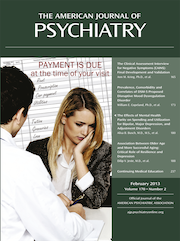Association Between Older Age and More Successful Aging: Critical Role of Resilience and Depression
Abstract
Objective
There is growing public health interest in understanding and promoting successful aging. While there has been some exciting empirical work on objective measures of physical health, relatively little published research combines physical, cognitive, and psychological assessments in large, randomly selected, community-based samples to assess self-rated successful aging.
Method
In the Successful AGing Evaluation (SAGE) study, the authors used a structured multicohort design to assess successful aging in 1,006 community-dwelling adults in San Diego County, ages 50–99 years, with oversampling of people over 80. A modified version of random-digit dialing was used to recruit subjects. Evaluations included a 25-minute telephone interview followed by a comprehensive mail-in survey of physical, cognitive, and psychological domains, including positive psychological traits and self-rated successful aging, scaled from 1 (lowest) to 10 (highest).
Results
The mean age of the respondents was 77.3 years. Their mean self-rating of successful aging was 8.2, and older age was associated with a higher rating, despite worsening physical and cognitive functioning. The best multiple regression model achieved, using all the potential correlates, accounted for 30% of the variance in the score for self-rated successful aging and included resilience, depression, physical functioning, and age (entering the regression model in that order).
Conclusions
Resilience and depression had significant associations with self-rated successful aging, with effects comparable in size to that for physical health. While no causality can be inferred from cross-sectional data, increasing resilience and reducing depression might have effects on successful aging as strong as that of reducing physical disability, suggesting an important role for psychiatry in promoting successful aging.



